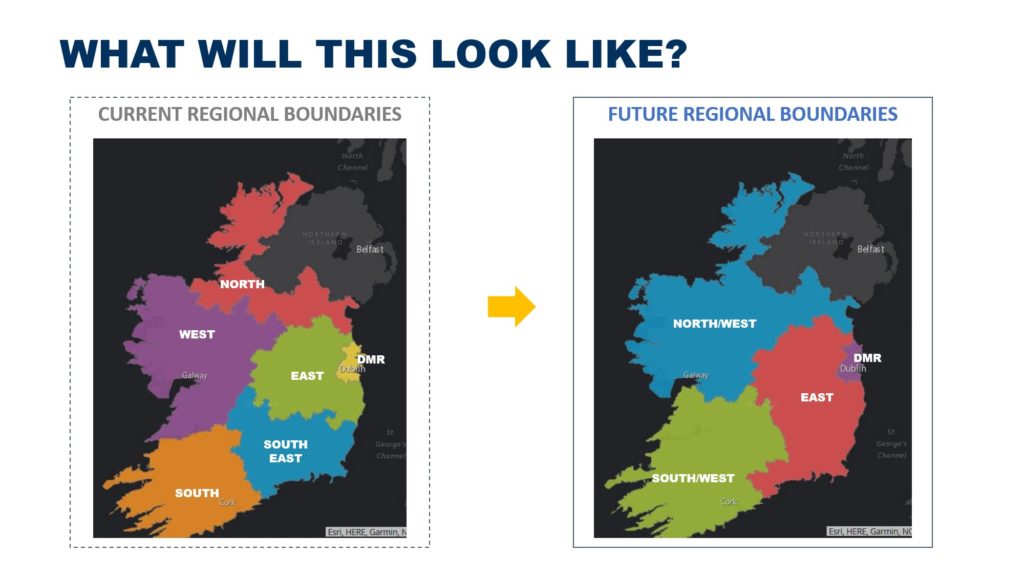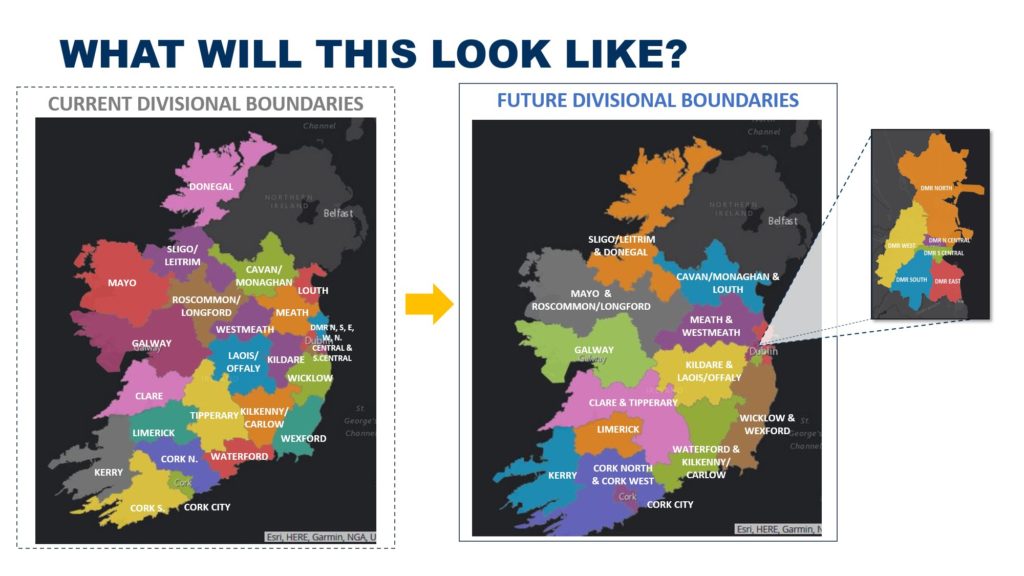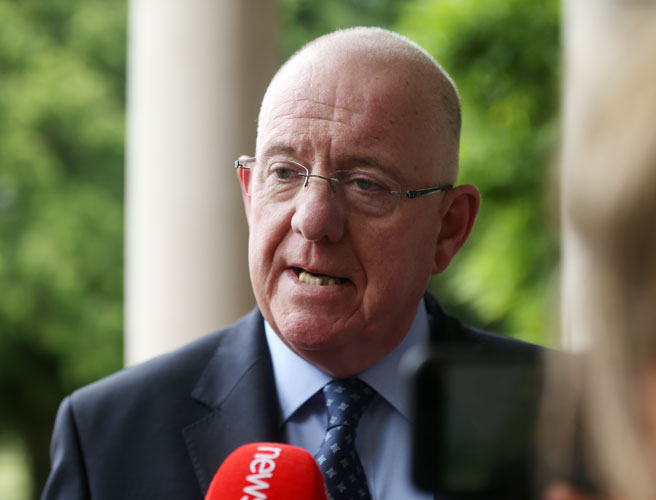Some 1,800 more Gardaí are to be put on the front-line by 2021, as part of radical changes to the way the force operates.
Commissioner Drew Harris unveiled a new operating model for An Garda Síochána on Thursday.
The number of divisions is being reduced from 28 to 19, while the number of regions will drop from six to four.

 Source: An Garda Síochána
Source: An Garda SíochánaThe force says the new model will see improvements to the organisation's structures, processes, services and governance.
Gardaí say this will also deliver a more localised service to communities.
The reduction in divisions will begin on a phased basis - while the new structure will be implemented throughout 2020.
NEW: 1,800 more Gardaí to be put on the frontline by 2021 as part of radical changes to the way the force operates. The number of divisions being reduced from 28 to 19. Regions to reduce from 6 to 4. pic.twitter.com/seDwocqi5A
— Shane Beatty (@ShaneBeattyNews) August 22, 2019
An Garda Síochána says: "It means more Gardaí working on the front-line, greater supervision, better resources, less paperwork, and more career opportunities for members and staff. It will make best use of an expanding workforce and investment in ICT."
There will also be a reduction in administrative structures, the introduction of community policing teams, a greater range of specialised services - such as economic crime and cyber-crime - being delivered locally, and enhanced local investigation of serious crimes.
From 2017 to 2019, 2,090 Gardaí have been recruited to date and a further 478 have been re-deployed to the front-line.
It is expected that from now until end of 2021, a further 1,500 Garda members will be recruited and an additional 1,000 re-assigned to the front-line.
 Garda Commissioner Drew Harris in Garda DMR headquarters at Harcourt Square | Image: RollingNews.ie
Garda Commissioner Drew Harris in Garda DMR headquarters at Harcourt Square | Image: RollingNews.ieCommissioner Drew Harris says: "These improvements will allow us to increase the number of Gardaí at the front-line and enhance community policing.
"Reduced bureaucracy and ICT initiatives combined with an increase in Garda members and Garda staff will increase Garda visibility in communities.
"It will mean Gardaí at all ranks will have more time to engage with local communities and stakeholders to help keep people safe.
"These changes will deliver a more visible, localised and responsive policing service. What won’t change though is the strong connection we have with local communities.”
Under this model, decision-making for policing delivery will be devolved from the centre to the regions and divisions.
A division will be typically made up of around 600 to 800 personnel.
Regions and divisions will also have greater control over how policing is delivered.
This model has been recommended by both the Commission on the Future of Policing in Ireland and the Garda Inspectorate.
Gardaí say it echoes the views of personnel gathered through extensive consultation.
This process has already started, with the introduction of the new local policing model in four divisions: Kevin Street, Cork city, Galway and Mayo.
 File photo of Justice Minister Charlie Flanagan | Image: Sam Boal/Rollingnews.ie
File photo of Justice Minister Charlie Flanagan | Image: Sam Boal/Rollingnews.ieJustice Minister Charlie Flanagan says the changes are designed to reduce bureaucracy and move real power and decision-making from Garda headquarters to the chief superintendents.
"Importantly, it will also result in more frontline leadership positions with sergeants and inspectors on the ground where leadership, supervision and mentoring is crucial," he says.
"In delivering on this commitment, the commissioner has listened carefully to those experts and, crucially, to the voices of local communities who consistently make clear they want to see more Gardaí available on the ground.
"While new to Ireland, this model is the norm in other countries and I am confident that the new structure will serve Ireland well and lead to a more agile and responsive police service improving safety for our local communities nationwide."
Reaction
The Association of Garda Sergeants and Inspectors (AGSI) says the plan "raises many questions" for its members.
It says while it will support the implementation of the new operational policing model, there are very many unanswered questions particularly around funding, manpower and the impact on rural policing.
"While the commissioner is quoted as saying that the model is designed to enhance community policing the AGSI is concerned at the removal of a management structure that has direct responsibility for the governance and accountability of frontline policing.
"Large rural towns across Ireland will no longer have a Garda Superintendent present locally but instead may be based in an adjoining county.
"Previous reports on the functioning of An Garda Síochána have been heavily critical of Garda management for being too far removed from operational policing.
"But today we see a further downgrading of management, which will pose challenges for Sergeants and Inspectors who rely on managers to supervise and guide us in our role", the association says.
"Frontline members are extremely frustrated at the introduction of another new model on top of a raft of other models and the impact on organisational change.
"Members are not seeing the change that is supposed to be occurring on the frontline."
It adds: "Consultation was at best rushed and came late in the day.
"AGSI now have to brief our members on the model’s potential impact but we have many questions unanswered such as the Government’s commitment to fund this plan."
Meanwhile the Garda Representative Association (GRA) has met Commissioner Harris over the proposed changes.
Its General-Secretary Pat Ennis says he welcomes Commissioner Harris's indication that he is open to considering feedback from the association.
Mr Ennis says: "I met with Garda Commissioner Drew Harris yesterday.
"He assured me the plan published this morning is not necessarily the last word on this issue and that the views of the GRA and others will be considered.
"I welcome this, and the fact that the Commissioner has ended the speculation around the plan which was based on a version leaked to the media.
"The absence of hard information was a concern to our members around the country - and other community stakeholders too.
"Now we have a sense of what is envisaged, our central executive committee can analyse the proposals and consider a response when it convenes next month."
Mr Ennis adds that the proposed re-organisation could have "a significant effect on our members' working lives" and their lines of management accountability.
He said there could also be implications for its representation structures, which will need to be considered in September.
Main image: Pictured are Gardaí on parade at a graduation ceremony at the Garda College in Templemore in 2018 | Image: Eamonn Farrell/RollingNews.ie









